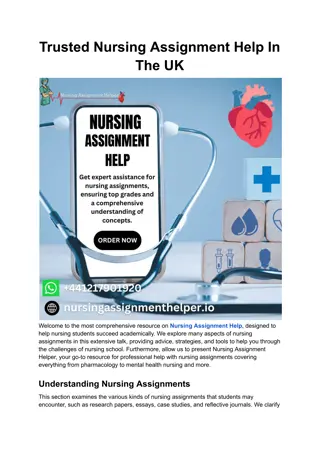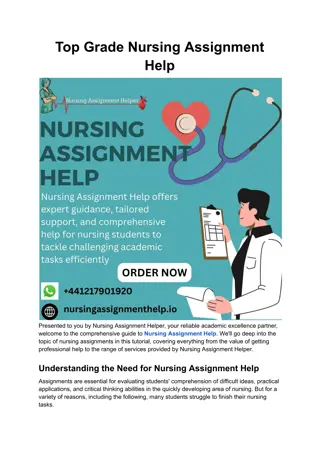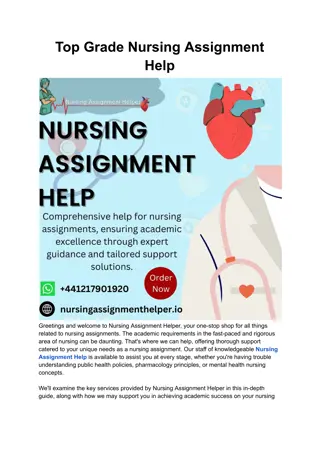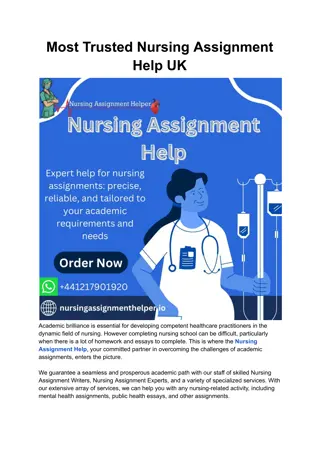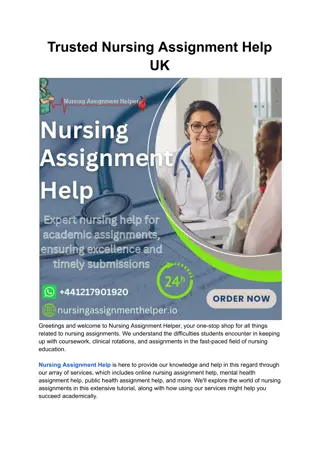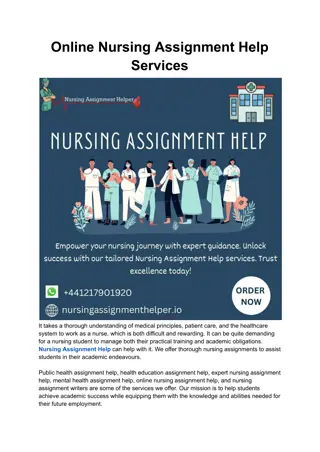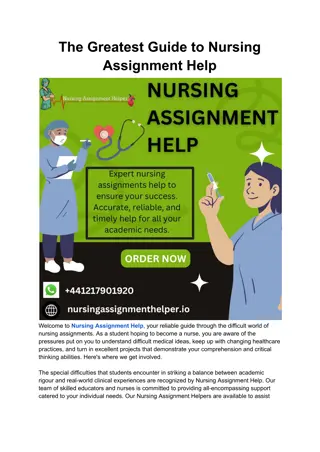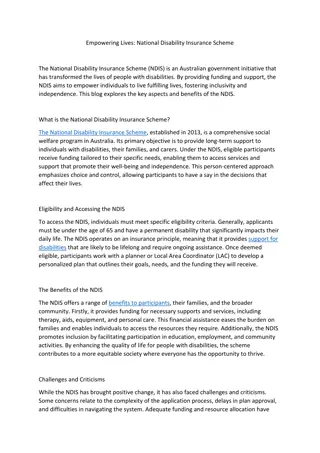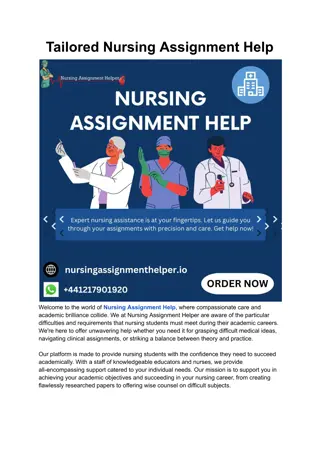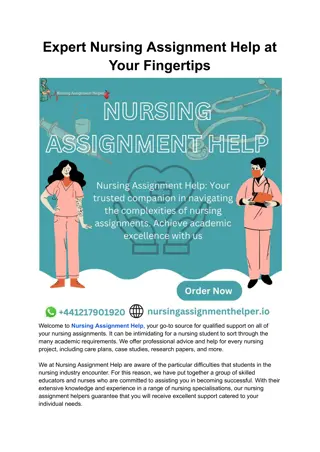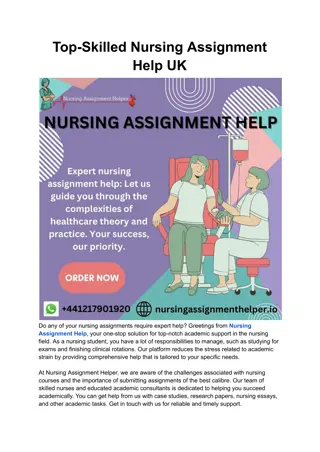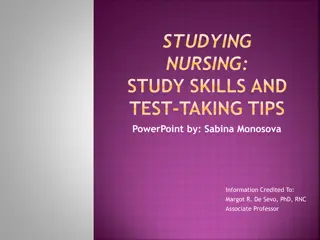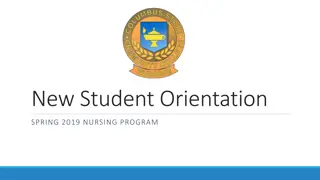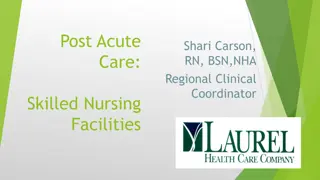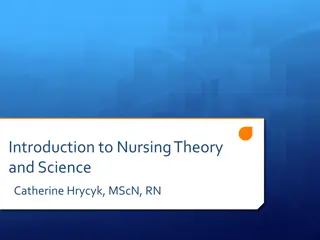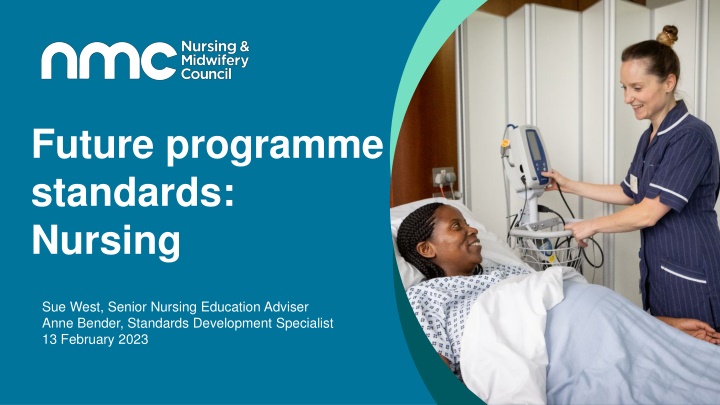
Nursing Programme Standards Update and Implementation Overview
Explore the evolution and implementation of future programme standards in nursing education, including changes post-UK's departure from the EU, stakeholder engagement, and the independent review findings. Learn about the key areas of focus and the timeline for approval and publication of updated standards.
Download Presentation

Please find below an Image/Link to download the presentation.
The content on the website is provided AS IS for your information and personal use only. It may not be sold, licensed, or shared on other websites without obtaining consent from the author. If you encounter any issues during the download, it is possible that the publisher has removed the file from their server.
You are allowed to download the files provided on this website for personal or commercial use, subject to the condition that they are used lawfully. All files are the property of their respective owners.
The content on the website is provided AS IS for your information and personal use only. It may not be sold, licensed, or shared on other websites without obtaining consent from the author.
E N D
Presentation Transcript
Future programme standards: Nursing Sue West, Senior Nursing Education Adviser Anne Bender, Standards Development Specialist 13 February 2023
Housekeeping slide We will be making written notes of your feedback We will be recording the session and will send the link out by email after the webinar Everyone watching is automatically muted Please use the questions box to share feedback and to present your queries we ll take questions at the end of the presentation We live-caption our online events to make them more accessible. Let us know if you re having technical issues via the questions box or on events@nmc-uk.org 2
Standards for pre-registration nursing programmes Our standards for pre-registration programmes: set out how programmes should be delivered enable students to learn safely and effectively were underpinned by EU law and included references to the EU Directive Since the UK s departure from the EU we have: carefully considered the impact of the Directives on our standards in co-production with our subject matter experts, undertaken a programme of work to propose some changes to remove references to the Directives updated our standards with improved focus on enhancement, flexibility, inclusivity and the safety of students and people using nursing services. 3
Future programme standards chronology Council approval Consultation and standards assimilation Independent Review and consensus Stakeholder Engagement Jan 23: Council approved the changes to now publish Dec 20 June 21: Independent review of the EU Directive Reports published May 22: Council assents to a 10 week public consultation Dec 21: Review and co-production of changes to the Programme standards 2020 2021 2022 2023 Feb 23: Implementation of the standards will now commence. We aim to publish new versions of the education and programme standards in March/April 23: The independent review found: limited evidence or consensus for change, however enabled opportunity to create some modernisation and flexibility in some areas Overall support for the proposed changes, with educators, younger respondents and student nurses more likely to agree. Small word changes made for clarity in some of the standards proposed Supporting information will be developed: appropriate safeguarding; experience of different maternity providers; simulation and practice learning To remove the reference to the European Union (EU) Directive Co-production of amendments or additions to standards in four key areas of admissions; knowledge and skills; placements (nursing and midwifery) and the use of simulated practice learning (nursing only) Sept 21 Council approved a programme of work the Future Programme Standards review 4
Assurance The changes to the standards for pre-registration programmes have been guided by the evidence and stakeholder consensus from our pre-consultation engagement, consultation and user testing findings and post consultation assimilation We have listened to thousands of people across the UK who have supported us throughout and have help to shape these proposed changes to our standards Under Professor Jean White s leadership, the Steering Group has challenged us and ensured that we have followed all processes in line with our governance Council approved these changes 25 January 2023. 5
Summary of changes to the standards for pre-registration nursing programmes We have: removed of all references to the EU Directive and Annexe 1 of the programme standards removed of the requirement of evidence for 12 years general education as part of the selection and admission for pre-registration nursing and midwifery programmes included a new standard on safeguarding for any potential student under the age of 18 in the education framework reworded to retain the standards on required minimum programme length and hours removed the EU reference regarding content, knowledge, skills and placement settings for pre-registration nursing, our standards of proficiency meet or exceed this detail. enabled the increased use of simulation as part of the 2300 practice learning hours in pre-registered nursing programmes and new glossary definition for simulation for all standards aligned other programme standards based on this review where required. 6
All references to the EU Directive including the annexe in the standards for pre-registration nursing programme have been removed 7
Changes regarding selection and admission for pre- registration nursing and midwifery programmes Current standard Deleted, amended or new standard Standards 1.8 ensure that all those enrolled on pre-registration nursing programmes are compliant with Article 31(1) of Directive 2005/36/EC regarding general education length as outlined in Annexe 1 of this document. DELETED Removes the reference in the Directive to evidence 10/12 years general education Part 3: Standards for pre-registration nursing programme 1.1.1 are suitable for their intended field of nursing practice: adult, mental health, learning disabilities and children s nursing AMENDED 1.1.1 meet the entry criteria for the programme as set out by the AEI and are suitable for their intended field of nursing practice: adult, mental health, learning disabilities and children s nursing Part 3: Standards for pre-registration Nursing Programme None, new standard required and applies to all programmes NEW 2.8 ensure that for students below the age of 18 on admission to their intended programme, appropriate safeguarding measures and any necessary programme adjustments are in place to support them and people in their care Part 1: Standards framework for nursing and midwifery education 2.12 ensure that all pre-registration nursing programmes meet the equivalent of minimum programme length for nurses responsible for general care in Article 31(3) of Directive 2005/36/EC (included in Annexe 1 of this document) AMENDED 2.12 ensure that all pre-registration nursing programmes meet the equivalent minimum length of three (academic) years for full time programmes, which consist of a minimum of 4,600 hours Part 3: Standards for pre-registration nursing programme 8 8
Changes regarding the knowledge, skills and placement settings for pre-registration nursing programmes Current standard Deleted, amended or new standard Standards 4.11 ensure the knowledge and skills for nurses responsible for general care set out in Article 31(6) and the competencies for nurses responsible for general care set out in Article 31(7) of Directive 2005/36/EC for pre- registration nursing programmes leading to registration in the adult field of practice have been met. (Annexe 1 of this document). DELETED Knowledge and skills are covered by the standards of proficiencies Part 3: Standards for pre-registration nursing programmes 2.11 ensure pre-registration nursing programmes leading to registration in the adult field of practice are mapped to the content for nurses responsible for general care as set out in Annexe V.2 point 5.2.1 of Directive 2005/36/EC (included in Annexe 1 of this document) DELETED Content and practice learning experiences are covered by the standards of proficiencies and the requirement to meet these. Part 3: Standards for pre-registration nursing programmes 9 9
Changes regarding the use of simulation in standards for pre- registered nursing programmes 10
Changes regarding the use of simulation in pre-registered nursing programmes Current standard Deleted, amended or new standard Standards AMENDED and MOVED 2.10 ensure technology and simulation opportunities are used effectively and proportionately across the curriculum to support supervision, learning and assessment Part 3: Standards for pre-registration nursing programmes 3.4 technology enhanced and simulation-based learning opportunities are used effectively and proportionately to support learning and assessment and pre-registration nursing programmes leading to registration in the adult field of practice comply with Article 31(5) of Directive 2005/36/EC (included in Annexe 1 of this document) NEW 3.4 provide no less than 2,300 practice learning hours, of which a maximum of 600 hours can be simulated practice learning 11 11
Amendments to other standards based on this review: Part 3: Standards for pre-registration nursing associate programmes Part 3: Standards for prescribing programmes Part 3: Standards for return to practice programmes 12
Current standard Deleted, amended or new standard Standards NA NEW to align with nursing: 1.1.1 meet the entry criteria for the programme as set out by the AEI and are suitable for nursing associate practice. Part 3: Standards for pre-registration nursing associate programmes 2.6.2 programme hours required of nursing degree programmes, currently set under Article 31(3) of Directive 2005/36/ EC (4,600 hours) no less than 50 per cent of the minimum DELETE reference to the EU Directive as no longer required 2.6.2 no less than 50 per cent of the minimum programme hours required of nursing degree programmes, Part 3: Standards for pre-registration nursing associate programmes 3.3 technology enhanced and simulation-based learning opportunities are used effectively and proportionately to support learning and assessment and pre-registration nursing programmes leading to registration in the adult AMENDED and MOVED to align with nursing 2.8 ensure technology and simulation opportunities are used effectively and proportionately across the curriculum to support supervision, learning and assessment Part 3: Standards for pre-registration nursing associate programmes 3.3 technology enhanced and simulation-based learning opportunities are used effectively and proportionately to support learning and assessment and pre-registration nursing programmes leading to registration in the adult AMENDED and MOVED to align with nursing 2.6 ensure technology and simulation opportunities are used effectively and proportionately across the curriculum to support supervision, learning and assessment Part 3: Standards for prescribing programmes 3.4 technology enhanced and simulation-based learning opportunities are used effectively and proportionately to support learning and assessment and pre-registration nursing programmes leading to registration in the adult AMENDED and MOVED to align with nursing 2.11 ensure technology and simulation opportunities are used effectively and proportionately across the curriculum to support supervision, learning and assessment Part 3: Standards for return to practice programmes 13 13
New glossary definition for all programme standards and framework Current definition New definition Standards Simulation: when used for learning and/or assessment is an artificial representation of a real world practice scenario that supports student development through experiential learning with the opportunity for repetition, feedback, evaluation and reflection. Effective simulation facilitates safety by enhancing knowledge, behaviours and skills Simulation: an educational method which uses a variety of modalities to support students in developing their knowledge, behaviours and skills, with the opportunity for repetition, feedback , evaluation and reflection to achieve their programme outcomes and be confirmed as capable of safe and effective practice. All Part 3: Programme Standards, and Part 1 Standards framework for nursing and midwifery programmes 14 14
Transitional arrangements What happens next now that Council has approved these changes? There will be: a transitional period in which AEIs will be able to implement the standards through our quality assurance (QA) processes a need for all AEIs to demonstrate that they are implementing the required changes by 31 January 2025 a full communication and engagement plan for implementation and approval of modification to already approved programmes in line with our QA framework publication of the approved education and programme standards for nursing and midwifery, and supporting information for the purpose of implementation in March/April 2023 closure of the final recovery standards RN5; RN5.1 and RN6D. 15
International research: The context in which programmes are delivered using fewer practice learning hours
The international context Countries explored included: USA; Canada; Philippines: Australia; and New Zealand. They require at least a three year programme The research suggested the delivery of fewer practice learning hours in some countries is driven by a variety of factors e.g. Political pressures, such as the worldwide nursing shortage. Pressures in the healthcare system, such as the challenge of finding clinical placements. However, all countries felt that their practice hours were sufficient to train nurses to be ready to enter the workforce It was not possible to explore whether proficiencies expected at the end of the programmes were comparable to the UK. 17
Analysis of the findings In addition to the differences in practice hours, there are other key differences in the approach to student education between the countries explored and the UK which could potentially facilitate fewer practice hours: 1. More tightly managed clinical teaching (incorporating teacher certification in some cases), which assures high quality practice learning experiences 2. An end point assessment, providing additional assurance of fitness to practise prior to registration 3. Post registration graduate programme are strongly encouraged to increase confidence, autonomy and competence 4. Generalist training (rather than field specific) 5. High quality simulation in addition to practice hours. 18
Implications for the NMC and future work Based on the research and ongoing feedback, we are committed to exploring whether further changes to our standards for pre-registration programmes are necessary to enable workforce strategies in each of the UK nations. We will retain our Future Programme Standards Steering Group and will explore the potential for further changes to the nursing programme standards, seeking further evidence and stakeholder consensus particularly around practice learning hours. 19
Questions? Thank you




